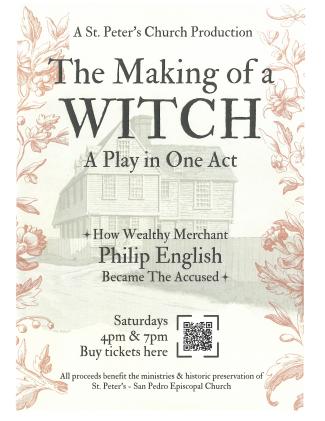St. Peter's-San Pedro Church in Salem, founded in 1733 and one of the original Episcopal parishes in Massachusetts, is staging a new, original one-act play, "The Making of a Witch."
It draws on extensive research that the church's rector, the Rev. Nathan Ives, and parishioners conducted through the church’s archives and other historical sources to discern more of the truth about their church's storied founder, Philip English, and his wife, Mary, who were both wrongly accused of witchcraft in the trials of 1692 but, unlike so many others, escaped.
The play was written by Rory O’Brien, produced by Jill Christiansen and directed by Theresa Giard, and is being performed by local actors in St. Peter’s Chapel, behind the main church, on Brown Street, on Saturdays through June 29. “We are truly thrilled to be offering the truth about Philip English, an Anglican in the midst of Puritan Salem and the amazing story of his life. Our team has worked so hard to share his incredible story and help the public know fact from fiction in his fight for religious tolerance,” Ives said in a news release.
The Saturday performances are at 4 p.m. and 7 p.m. Tickets are $20 and are available for purchase online at www.stpeters-sanpedro.org and, depending on supply, at the door.
"Philip English was one irascible dude," Ives said in an interview, describing the Isle of Jersey-born immigrant as a complicated and vivid character of his day, a self-made merchant, one of Salem's wealthiest, who, if not an enslaver himself, was someone who certainly derived wealth from the slave trade. He was also benevolent to those suffering from poverty in the community, and late in his life, donated the land on which to build St. Peter's, which is now the oldest church in Salem still conducting worship on the site where it was founded.
English's "irascible" nature and litigious ways did not win him friends amongst the Puritans, and though he was elected a selectman in 1692, Ives said, "He had three things going against him: He was wealthy, he had political power and he was Anglican. Perhaps the Puritans wanted him out, and so he and his wife got wrapped up in the witch trials."
Largely because of its witch trial history, Salem receives some two million visitors a year--about half of them during the Halloween season. Ives noted that since St. Peter's-San Pedro is part of Salem's history tours because of Philip English, the new play is a way for the church to reclaim a part of the story. The church hopes to give the play another run this fall. "There is so much fiction out there, so we wanted to ground it in historical truth and be the tellers of the story," he said--and try to raise some money while they're at it. Proceeds will fund the church's ministries and historic preservation.
St. Peter’s-San Pedro Church describes itself today as "an active, bilingual, multicultural and affirming church in Salem that is deeply committed to social justice and serving the community through liturgies in English and Spanish. Through programs such as Laundry Love, the Free Winter Coat Closet and Diapers for Young Mothers initiative and more, the parish strives to meet people where they are and lend a compassionate hand whenever possible."
--Tracy J. Sukraw

